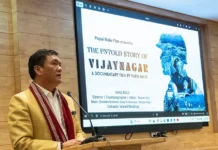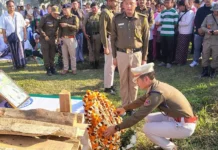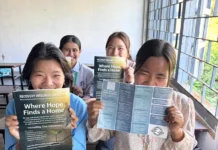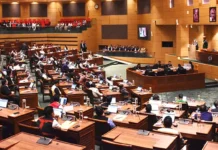[ Badak Yomgam ]
Women’s empowerment, particularly by means of running non-governmental organizations (NGO) and operating homestays, is absolutely crucial for the sustainable growth of rural tourism in Arunachal Pradesh. This approach taps into women’s inherent strengths as caregivers, homemakers and cultural preservers, transforming them into vital economic contributors and community leaders.
Homestays, for instance, are a natural fit for the region’s rural charm, offering a direct path for women to gain economic independence by monetizing their traditional skills in cooking, hospitality and storytelling. This not only boosts their household’s income but also significantly enhances their role in financial decision-making, shifting them from passive contributors to active participants.
Furthermore, by opening their homes, women become guardians of indigenous knowledge, sharing their unique cultures, traditions and local cuisines with visitors, which is fundamental to both cultural preservation and the promotion of Arunachal’s rich heritage. The daily interactions with diverse guests also serve as a powerful catalyst for social empowerment, broadening women’s perspective, sharpening their confidence and community involvement.
This flexibility of managing homestays from home also allows women to balance traditional domestic responsibilities with income generation, making it a more accessible venture.
NGOs play a fundamental role in nurturing this empowerment. They step in to provide essential capacity building and training, covering everything from professional homestay management and hygiene standards to basic accounting, marketing and even digital literacy to help women list their properties online. Beyond skill development, NGOs are instrumental in facilitating access to finance, often by forming and supporting self-help groups(SHG). These groups empower women to pool savings, access micro-loans and collectively invest in tourism-related ventures, overcoming common barriers such as lack of collateral.
NGOs also act as vital market linkages, connecting women artisans with broader markets for their traditional crafts and actively promoting women-run homestays to potential visitors. On a broader scale,NGOs engage in advocacy and policy influence, ensuring that women’s voices are heard in tourism planning, and that policies are gender sensitive. They also tackle social barriers through awareness campaigns, challenging stereotypes and fostering an environment where women’s economic contributions are recognized and valued. By combining the intimate, authentic experiences offered by women-run homestays with the structured support and advocacy of NGOs, Arunachal can cultivate a sustainable and inclusive rural tourism sector, powered by economically vibrant, socially recognized and culturally proud women.
To illustrate these points with concrete examples, several organizations and individuals stand out. The Arunachal Pradesh Women’s Welfare Society (APWWS), while broad in its mandate, contributes significantly through its advocacy and skill development initiatives, creating a supportive environment for women to venture into entrepreneurship.
Organizations like the AMYAA in Roing actively engage in community development and capacity building, directly impacting women’s ability to participate in the tourism economy. Various SHG federations, often supported by schemes like the National Rural Livelihood Mission, are essential. These groups empower women to pool resources and collectively run tourism-related enterprises, from managing homestay clusters to producing local handicrafts. Even organizations like Worldwide Fund for Nature (WWF-India) have demonstrated success in community-based tourism projects in areas like Chug village, Dirang, where women are key to managing hospitality and showcasing traditional life, linking conservation with livelihood.
The impact of homestay owners is truly remarkable, with many taking on entrepreneurial roles. Sinawati Mungyak is the proud owner of Hewly Homestay, which started in 2014 and became the first registered homestay in Namsai in 2019. Ninashi Kri Minin is the owner of Mashimi Living Homestay located in Mawai, Lohit, renowned as the first to get a homestay registered by the Tourism Department of Arunachal in 2018. Similarly, Bella Tikhak Namshum’s Tikhak Homestay in Miao, strategically located near the Namdapha National Park, showcases how women integrate traditional culinary skills, offering guest local delicacies alongside accommodation.
A shining example of pioneering spirit is C Meyor, the owner of Kaho homestay in the remote border village of Kaho. She has not only provided crucial accommodations for visitors to this strategic location but also opened the pathway for other women in the village to consider similar ventures, bringing vital economic activity to a previously isolated area. Other notable women homestay owners across the state include figures like Yamoty Pigyor of Jaibona Homestay in Aalo and Rubu Ampi of Lempia UdeHomestay in Ziro.
It is also worth noting that the success of homestays in general, such as Reyi Homestay in Aalo, which was awarded as the best homestay in the state by the Ministry of Tourism, Arunachal Pradesh, in 2024, serves as a powerful testament to the potential of this sector. Its recognition highlights the viability and growth opportunities within the homestay industry, thereby indirectly encouraging more women to consider and invest in similar entrepreneurial ventures. It is important to acknowledge that not all homestays in Arunachal are run by women, but their presence is increasingly visible and impactful. Many, like those mentioned, manage their establishments either independently or with family support, serving as vital examples of women’s empowerment, driven by both individual entrepreneurial spirit and the pivotal support structures provided by NGOs, in shaping a thriving and authentic rural tourism landscape in Arunachal. (The contributor is a PhD scholar at NEHU, Shillong)




